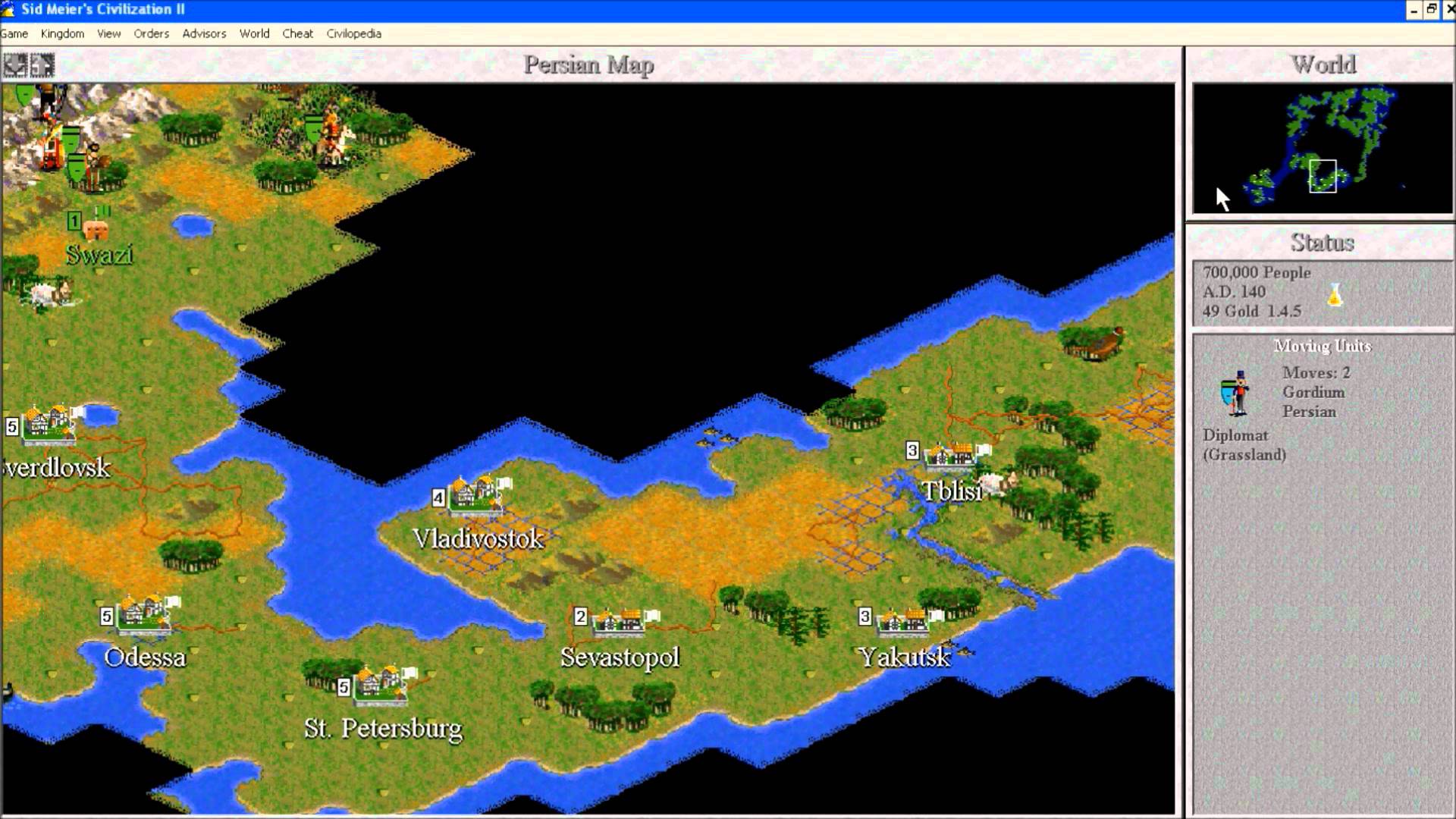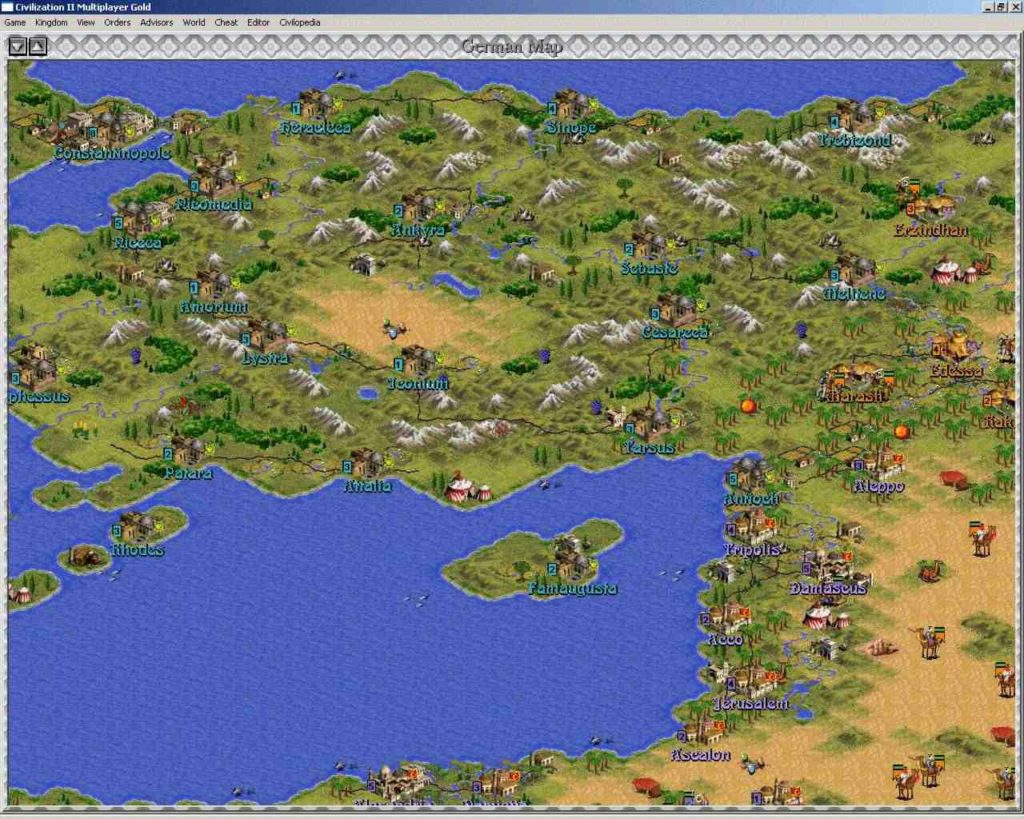
Now I really do understand that Civilization, as a series, is amongst the most well-produced and consistent offerings in strategy gaming. I also understand that there is a strong argument for the fifth iteration being the best of all but, for me at least, it’s Civilization II that really captures everything that the series is all about. To eliminate the original from the equation, it really hasn’t aged well, with the switch from a top down view to an isometric style of play, the most important difference between the two games. The top-down perspective does work but only just, largely because of the first titles more limited feature set.
Now if you know how old I am, I understand why you might think that I don’t really have a right to talk about it, but it’s pretty much the only game I’ve consistently returned to throughout the entirety of my video game playing life. There are a number of reasons for this. Firstly, it was introduced to me by my step-dad when I was very young, so essentially I grew up with it being perpetually displayed on our clapped out family computer, and so, for me, it’s drilled its way into my heart over a prolonged period of time. Now, I recognise that these aren’t necessarily quantifying reasons as to why this is the best game, but for the purposes of clarity, it’s important for me to make my bias known.

On to the big stuff then. The reason that Civilization II is the best game, is because it offers absolutely everything the series needs, feature-wise, whilst still maintaining a stripped back simplicity hitherto unseen in strategy gaming. There is absolutely something to be said for games of the ilk of Crusader Kings II (also one of my favourite games), which offer limitless facilities for personalisation of the game experience, but Civilization II doesn’t need to do that. It rewards the player for working out their most effective strategies and implementing them properly. Which wonders to build, and at what time, what technologies to advance and which AI civilizations tend towards what behaviours – experience is hugely important. For instance, I am certain that the game is irreparably biased towards the USA, so, if they are in my game, I always try and finish them off early before they get marines and machine gun my phalanxes to death. Warmongering Ghandi also makes an appearance, so you do have to watch out for him and his pesky penchant for nuclear annihilation.
On that topic, the difficulty settings are brilliant. Even after all these years it takes all my concentration to come out the other side of Emperor difficulty as the sole victor. Deity is so absurdly difficult that it’s basically the strategy equivalent of a “survive as long as you can” zombies mode, and that’s great because it’s given me over 15 years of motivation to try and beat it (which I’ve done once, sort of, by making it into space as quickly as I could). Further to that, little features really add a feel to the game that I just don’t quite get from other titles in the series. The High Council, who only make an appearance if you still have your original game disc, are actual recorded actors, one of whom is consistently dressed like Elvis, who squabble over what I should do next and offer very little in the way of useful advice. But it doesn’t really matter, it just adds to the immersion in a way that I hadn’t seen before. The upgradable throne room was also fantastic, going from a little wooden chair and walls covered in fur to a palace so bombastic it would make Elton John feel uncomfortable, everything seemed, at the time at least, important. Whilst later games are more packed with features, they don’t offer the same unique appeal that the second does.
Little huts that could have been filled with scrolls of ancient wisdom or, equally likely, a horde of barbarians made every encounter exciting. Obviously I always go in the hut, but to find your one early game phalanx squashed into the floor by a barbarian horseman was both disheartening and thrilling. Not taking your ships too far away from land until you have the great lighthouse, and other critical in game strategies, made the learning curve steep for someone as young as I was, but it never felt like a chore. The learning experience is still continuing to this day for me and this game is unique in that regard. Who knows, in ten years time it could be joined by CKII or some other grand strategy from Paradox, but at the moment it stands alone.
One of the key changes offered in the second game is the fact that the AI now had to go through the same requirements to produce buildings and units, which stopped the seemingly random nature of advancement from the first game. That’s not to say that they don’t scale a lot quicker at higher difficulties, but at least it makes sense. This has, of course, become a mainstay in the series to date, and is one of the core mechanics that makes the series work as it does, but Civilization II did it first. The scoring systems were all introduced in the second, with civilization percentage playing a key role, and the subsequent bestowed title making 10 year old me feel as though I was actually James the Magnificent. Everything was planned out to the most unbelievable level of detail, even the repetitive drumming soundtrack, and it worked brilliantly.
The real deep reason that Civilization II has to be considered the best game, for me at least, is because without it the series that has become so omnipresent in strategy circles may have been unrecognisable. Yes, Civilization III onward have added new units, technologies and updated graphics, but the core game mechanics have remained largely the same, with little need for a change from a game that did come out in 1996 after all. All that being said, this is just one very rose tinted view of why I think its the best, but if you disagree (as I know some of you will) then don’t hesitate to sound off in the comments below, and I’ll try to reply to as many as I can. If you haven’t played it, please do, I promise it’s worth it.




